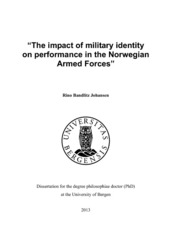The impact of military identity on performance in the Norwegian Armed Forces
Abstract
From a Norwegian point of view, doctrinaire guidance now set the premises for new perspectives related to the military ethos and identity. The exodus of idealism, a military identity based on traditional values as altruism, patriotism and nationalism, has opened up for professionalism as a preferred and necessary military identity in the Norwegian armed forces. Based on this paradigmatic change, it follows that if professionalism could be reliably defined and measured, it might contribute to the formation of a new selection instrument for leaders in the armed forces. However, there is little empirical research to support the predictive validity of military identity on relevant outcome variables, partly caused by a lack of appropriate measurements. Examining the predictive value of military identity, and professionalism in particular, are thus necessary steps before new selection and education procedures can be introduced for the development of future military leaders. The primary purpose of the present thesis thus was to investigate to what degree military identity actually predicts military performance in the Norwegian Armed Forces. The objective of the first study was to perform a psychometric evaluation of a Norwegian 33 item questionnaire, assessing internal consistency, performing an exploratory factor analysis, and investigating aspects of the construct validity of the scale. Moreover, test-retest reliability was investigated. A second purpose was to investigate if any individual level characteristics such as age, gender or service would be related to different identities. Such differences would be expected from identity theory and social identity theory. Study 1 was based on data from two sub studies; sub study a) included cross sectional data from military personnel in the Norwegian Armed Forces (N = 317), and sub study b) included longitudinal data from students conducting a one-year junior officer education (N = 238). A three-factor structure was identified comprising the dimensions of Professionalism, Individualism, and Idealism. Internal consistencies for the three subscales were acceptable, with Cronbach’s alphas varying between .60 and .83. Test-retest reliability and construct validity was supported. Finally, Professionalism scores were found to be significantly higher among Army personnel compared to Navy and Air Force personnel, whereas Individualism scores were significantly lower in the Army compared to the Navy. The second study included 101 cadets from the 3 Norwegian military academies (Army, Navy, and Air Force). This study examined if, and to what extent military identity might predict perceived military performance and attitudes, as measured by assessments of military skills, general military competence, and organizational commitment, beyond what was predicted by personality traits and Hardiness, in Norwegian military academy cadets. The third study included 347 students from Norwegian junior officer schools. It examined the influence of military identity on military performance, and the potential of military identity to predict military performance as measured by overall performance, petty officer potential, and leader performance beyond Military Ethos, Organizational Commitment, and Hardiness in Norwegian junior officer students. The findings from study 2 and 3 indicated that Military Identity predicted aspects of military performance. In study 2, Professionalism (labeled as Operational identity) predicted perceived military competence and skills positively, and Individualism predicted organizational commitment negatively. In study 3, Professionalism also predicted overall military performance. The findings from study 2 and 3 indicated that Military Identity predicted aspects of military performance. In study 2, Professionalism (labeled as Operational identity) predicted perceived military competence and skills positively, and Individualism predicted organizational commitment negatively. In study 3, Professionalism also predicted overall military performance. The present studies separately extended previous research. Study 1 offered a psychometric sound and stable instrument for measuring dimensions of military identity. It also offered a first indication of the distribution of different dimensions of military identity across the 3 services in the Norwegian Armed Forces, thus supporting Social Identity Theory. Furthermore, Study 2 and 3 both provided empirical evidence for the predictive value of military identity. These findings also confirmed both Professionalism and Individualism as important and independent constructs with a unique and added value to explain military performance. This thesis thus offers new knowledge into multiple fields related to the interplay between military sociological, psychological and performance variables
Has parts
Paper I: Johansen, R. B., Laberg, J. C., & Martinussen, M. (2013). Measuring Military Identity: Scale developoment and psychometric evaluations. Social Behavior and Personality, 41, 861-880. The article is available here: http://hdl.handle.net/1956/7835Paper II: Johansen, R. B., Laberg, J. C., & Martinussen, M. Military identity as predictor of perceived military competence and skills. Armed Forces & Society, online 28 may 2013. Full-text not available in BORA. The article is available at the publisher website: http://dx.doi.org/10.1177/0095327x13478405
Paper III: Johansen, R.B., Laberg, J.C., & Martinussen, M. (In press). The impact of military identity on Norwegian junior officer students. Journal of Political and Military Sociology: An annual review. Full-text not available in BORA.
